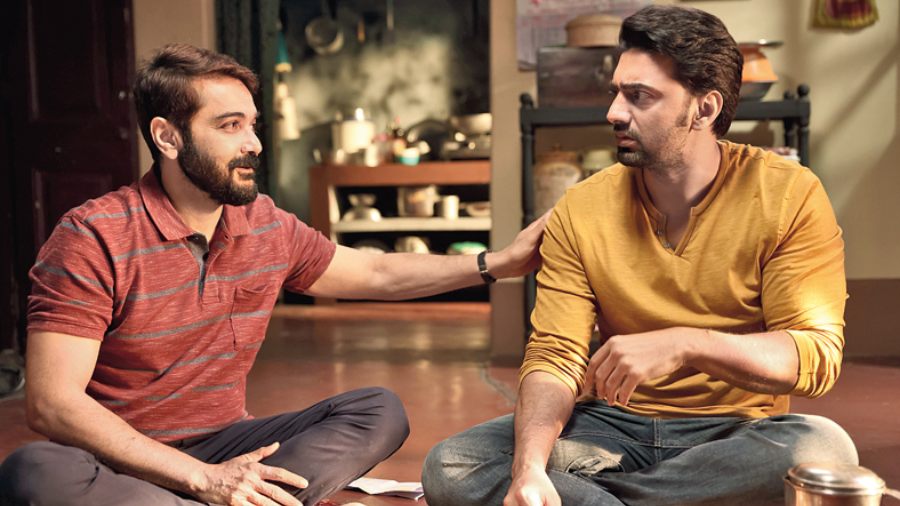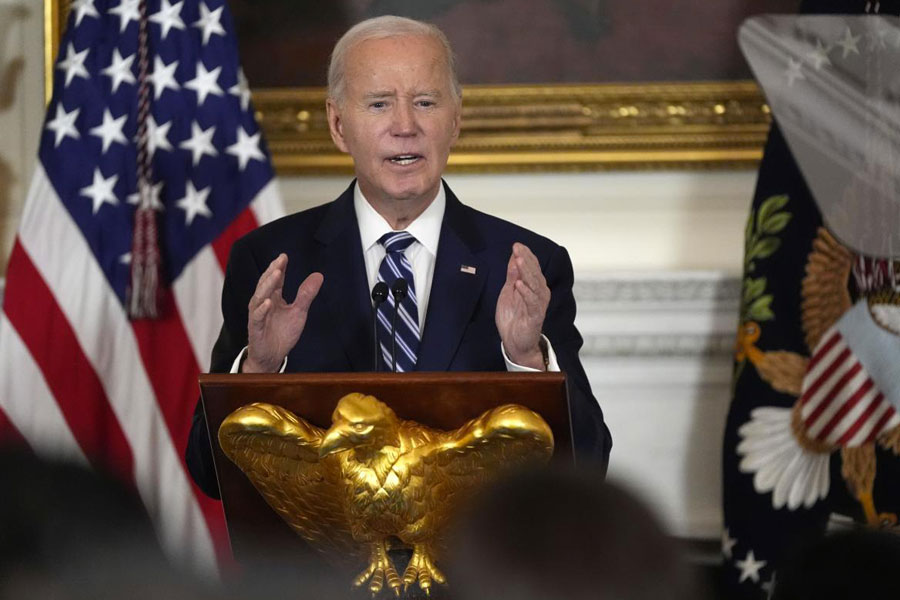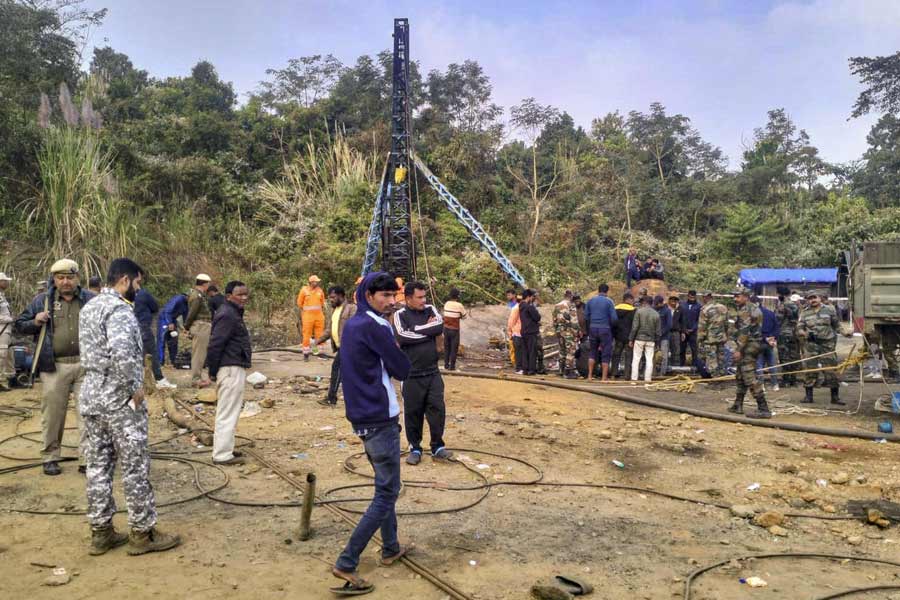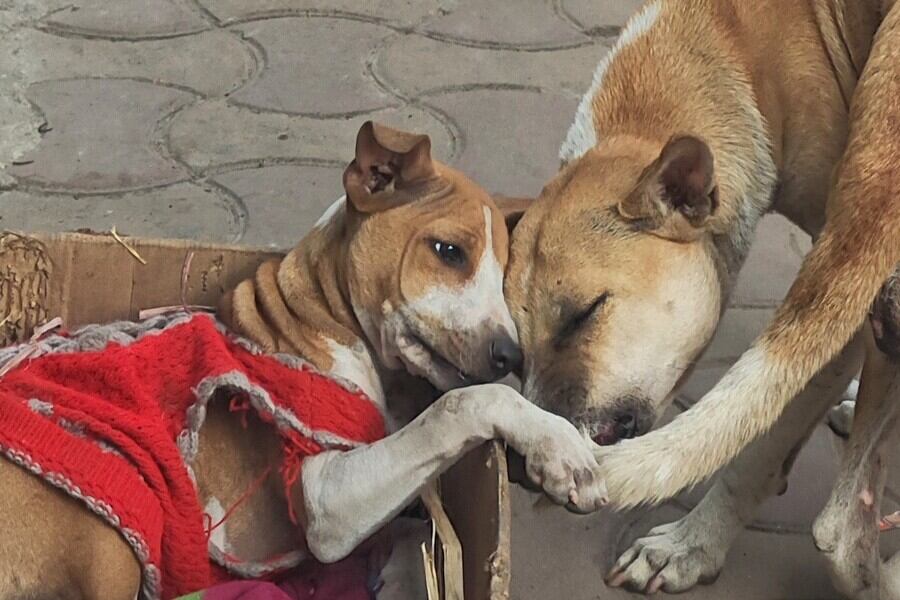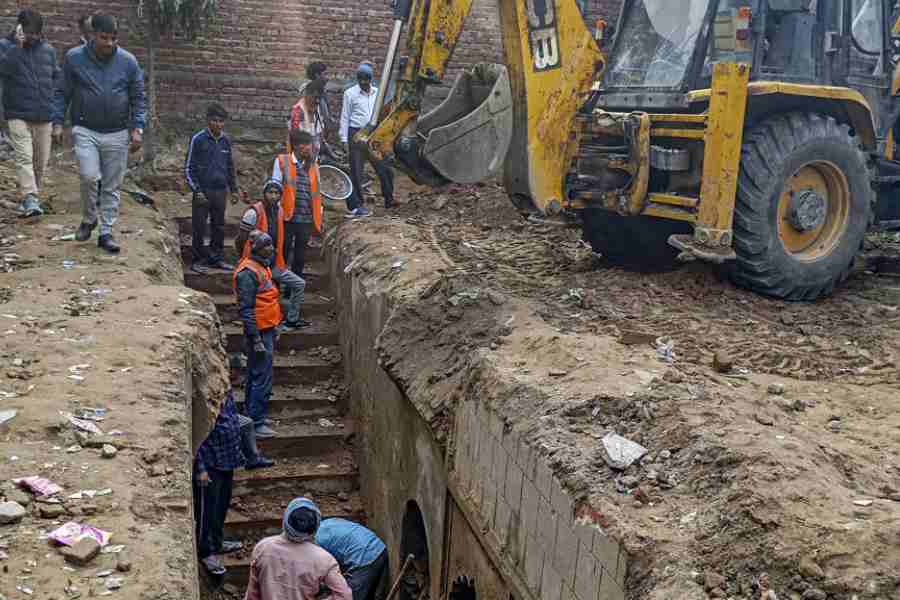The September 30 film Kacher Manush is a meditation on life and death. Directed by Pathikrit Basu, the film — that brings together superstars Prosenjit and Dev — follows Kuntal (Dev) who is weighed down by the demands and complications of life. Soon he meets Sudarshan (Prosenjit), an insurance agent, who gives him a plan to end his life, so that the insurance money can be used to treat his ailing mother. But things take a turn when Kuntal finds meaning and purpose in life. The Telegraph chat with Prosenjit and Dev.
Why keep a black-and-white sequence from the film Jibon Kahini at the beginning of the trailer of Kacher Manush? Is it a tribute or does Kacher Manush take off from there?
Dev: It is a tribute to that film. When I heard the story of Kacher Manush, I really liked it. And then we felt it would be really nice to use the footage of Jibon Kahini as a tribute. Everyone has loved the trailer of Kacher Manush. In my journey as a producer, I feel this trailer has got the best reaction. It’s been fantastic. We have been faithful to both our characters.
Prosenjit: It was the right decision from the production house. And think of that film... it was so ahead of its time, and it is still relevant now. It is extremely important to celebrate life in a film. Kacher Manush is an inspiring film.
How did Kacher Manush take off?
Dev: During the lockdown Pathikrit had got in touch with me and then he told me the story. Later we started discussing, and I told him that we can go ahead with the film only if Bumbada is there. And I know Bumbada; he is always there for good stories... I called up Bumbada and told him about it. We took two years on this. We are very happy with the film. I felt that it was the right time to address issues like depression affecting the young generation. Kacher Manush will inspire and motivate today’s youth.
Prosenjit: It was very important for me to endorse the film, and its socially relevant message. We can play a big role here. Of course, it is an entertaining film... there is laughter, tears, comedy, emotions, a strong love story. Love can change someone’s life completely. Also, there is a song called Taka lage in the film... and that is the truth. No one can deny it. One needs money to get by in life. When I saw all these elements in a film, I felt it was in the right space. And Kacher Manush completely justifies our coming together.
Dev: Just like Tonic, I felt that it was the right time to tell the story of Kacher Manush.
Bumbada, you had told The Telegraph in the past that it is very important for superstars to come together in Bengali films.
Prosenjit: The combinations are very important for the industry. You can see that happening in films down South. Kamal Haasan has done a film like Vikram (with Fahadh Faasil and Vijay Sethupathi). Then I saw the teaser of Chiranjeevi’s Godfather. It has a huge cast.
There was a time when Tapas Paul and I had worked together in 20-22 successful films, and we delivered innumerable solo superhit films as well. I feel it is time now to make more films with different star combinations... it’ll also enhance the creative spark of film-making.
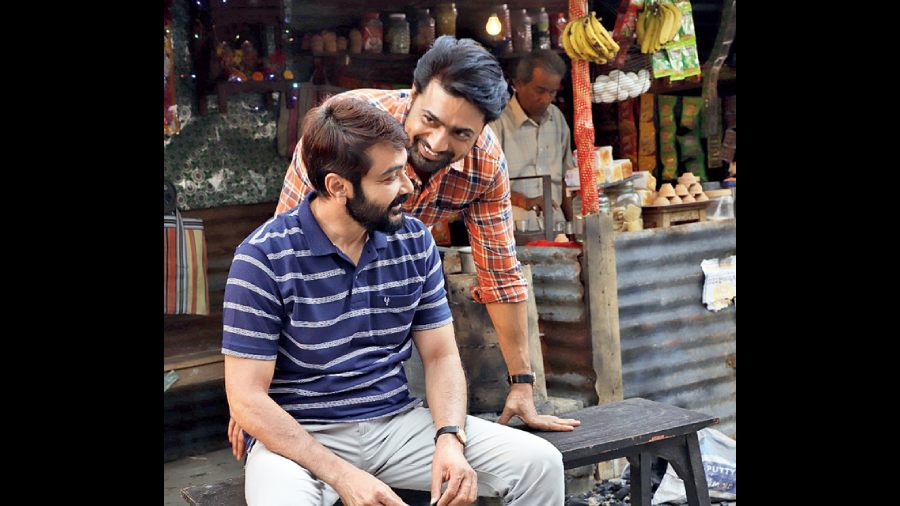
You have great respect for each other... but was there ever a sense of competition on the sets, maybe in a positive way, since both of you have so many scenes together in the film....
Dev: Our characters are very well defined and sketched out in Kacher Manush. And this is not that kind of a film where one dominates the other with heavy dialogues or songs or fight scenes. Kacher Manush is a very different kind of a film. If one had tried out anything extra or suddenly went beyond the script, the scene or sequence would have been ruined. Bumbada’s understanding of cinema and script is unquestionable. Both of us love cinema and we worked jointly to achieve a larger vision.
Prosenjit: Dev has a very strong image... but people will see him in a new light in Kacher Manush. And it was very important for our characters to balance it out. I always observe the work of the actor sharing screen space with me. It has always been a learning process for me. Dev has given me the dialogue cues. He could have easily left when I was giving my solo shots. But he was always there on set. With Dev present on set, I obviously gave a much better reaction shot.
Pathikrit’s previous films had got mixed reactions. How confident were you in his abilities as a director to pull it off?
Dev: In the last two-three years I have only worked with directors who were making their first or second feature film. I could sense their immense desire to work hard and prove themselves. I loved the stories of Tonic, Kishmish and Kacher Manush. See, I have confidence in myself. I have the best team for this film. Bumbada is the best person for his role. We have our work experience and we knew that it was important to support him. Pathikrit is very dedicated, hard-working and I wish him all the best.
Prosenjit: In my career, I have seen many assistants becoming directors and many went on to make a name for themselves. It was important to give him the support, space and time. Dev and I share a few commonalties... we want to bring in a change. We want to spot and nurture talented newcomers. DoP Modhura Palit is so good... she has brought a whole new texture to the visuals. And whenever I work in a film, I think of myself as the new one, so that the crew can communicate easily with me. I have to give them that space. That’s how I’ll learn something new.
Both of you have shot across Calcutta in real locations for this film. How challenging was that?
Prosenjit: I think there were around 32-33 outdoor locations, and huge crowds would gather.
How did you keep your focus?
Prosenjit: We shot guerrilla-style in quite a few locations, and our preparation was bang on. At times we would wrap a shot before the people there figured out what was happening.
Dev: From the placement of the camera to how long we would shoot... we had planned out everything in detail. Calcutta is a character in the film and it was important to shoot in real locations. At the same time Calcutta has become very shoot-friendly. On-lookers would listen to us. They understood the zone.
Bumbada, you play an insurance agent. How do you see your character?
Prosenjit: I can’t reveal much but you are in for a huge surprise. He sells dreams to people... I have worked on the details to build the character. I have really enjoyed the experience... I have tried my best. In the last few years, I have heard all kinds of observations about my work... people have talked about my natural style of acting... where I underplay. In Kacher Manush, there is a flip... my character demands that I slightly overplay it. Maintaining that balance is the actor’s job.
What did you discover about about each other while working on Kacher Manush?
Prosenjit: Dev’s passion and understanding of cinema. Dev has a separate identity as a producer. I have seen his journey... and I have high regard and respect for what he has been trying to do in the last five-six years as a producer. I have seen his passion for cinema... from doing larger-than-life films to serious cinema. And he has the belief in both.
Dev: Bumbada’s love for cinema. To save money on a shoot is also an actor’s responsibility. He was always on time... and if required he’d shoot for two extra hours and that would really help the film. Everyone in this industry should learn from him. Also, I got to see his method of acting, and how he develops a character.
Dev, does your character in Kacher Manush bear a slight resemblance with your character Amol in Bunohaans?
Dev: Initially, I thought so too. Amol was not that needy. Amol was ambitious. Kuntal is not like that. Initially we see that he has lost everything. I have taken maybe five per cent of Amol for Kuntal.

